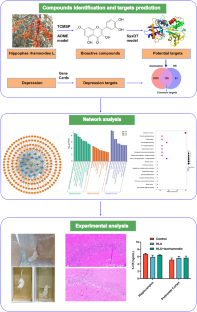Isorhamnetin Alleviates the Depression Induced by Hindlimb Unloading in Rats
Abstract
Depression induced by weightlessness exposure in spaceflight has seriously affected astronauts’ psychology and flight missions, but the preventive and treatment methods remain limited. Here, we used systems pharmacology to identify the potential bioactive compounds from Hippophae rhamnoides L. (HR) for treating depression caused by weightlessness. First, isorhamnetin was screened out as a potential drug in HR for treating depression. Further, the therapeutic effect of isorhamnetin was investigated in depression induced by weightlessness using the hindlimb unloading (HLU) rat model. We found that treatment with isorhamnetin notably shortened immobility time during forced swimming tests and tail suspension tests in HLU rats. The hematoxylin-eosin staining results revealed that isorhamnetin could ameliorate morphological damage to the hippocampus of HLU-induced rats. Moreover, exposure to HLU caused increased corticosterone (CORT) and adrenocorticotropic hormone (ACTH) concentrations in serum. Administration with isorhamnetin for four weeks reduced the ACTH and CORT content in HLU rats. The 5-hydroxytryptamine and dopamine content in hippocampus were reduced in HLU rats, which were increased after isorhamnetin-treatment. Conclusively, isorhamnetin can alleviate the depression and hippocampus damage induced by weightlessness. Our study identified that isorhamnetin could be a natural bioactive drug for depression.


 求助内容:
求助内容: 应助结果提醒方式:
应助结果提醒方式:


